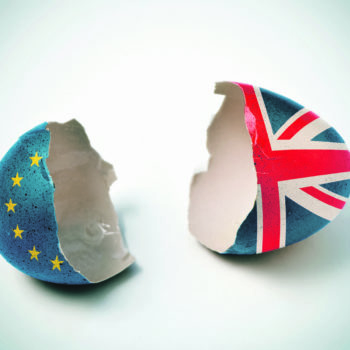Retail Ireland cautiously welcomes draft Brexit proposal

Retail Ireland director Thomas Burke has welcomed the draft Brexit withdrawal agreement currently making its way through the House of Commons in London, albeit with a warning that significant challenges remain for Irish retailers now, and after 29 March 2019.
20 November 2018
Despite chaotic scenes and frantic coverage, an orderly withdrawal from the European Union by Britain is possible, according to Retail Ireland, the division of Ibec that represents the sector. The group also warns that “enormous political hurdles” still exist before the controversial deal can be ratified; until then, Ireland should continue preparing for the so-called “no-deal Brexit.
The comments by Retail Ireland director Thomas Burke accompany the launch of the group’s latest policy paper, titled “Brexit: Putting Consumers First”. It calls on government to focus even further on making Ireland’s retail sector “Brexit-proof”, including increased investment in vital infrastructure around Ireland’s ports to ensure supply chain operations remain seamless, while additional costs are minimised.
“The draft Brexit withdrawal agreement contains very welcome provisions,” Burke said, “that would minimise disruption to the Irish business community. However, until the agreement is ratified, we are continuing to caution our members as to the risks of a ‘no deal’ outcome. A ‘no deal’ outcome would have devastating economic consequences and must be avoided. The sooner we have certainty around the deal the better.”
Regardless of the type of Brexit agreed over the coming weeks, retailers are being warned that they will likely see an increase in their operating costs arising from checks at ports and other supply chain disruption. “In the current operating environment,” Burke said, “these additional costs simply cannot be absorbed by retailers and will have to be passed on to consumers in the form of higher prices.”
A recent ESRI report suggests that with the inclusion of tariffs and taxes, this additional cost could increase the cost of living by up to 3% or €1,360 per annum. “Government must do all in its power over the coming weeks and months to minimise this impact,” Burke said.
In the report, Retail Ireland states that the government should, as a matter of urgency:
- Ensure a strong focus on cost competitiveness in areas such as labour, minimum wage, energy and insurance costs
- Protect competitiveness and not impose new costs on retailers or consumers, including regulatory costs.
- Provide further support for small and medium-sized Irish retailers to assist them in capturing the online spend of Irish customers
- Increase investment in transport projects and the modernisation of our revenue and customs systems must take place to allow for the seamless introduction of new EU custom controls.
- Renew focus on black-market products such as illicit alcohol and tobacco products and counterfeit goods.
- Raise awareness of the Future Growth Loan Scheme announced as part of Budget 2019 amongst businesses who could benefit greatly from funding.



 Print
Print





Fans 0
Followers